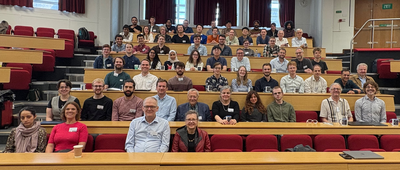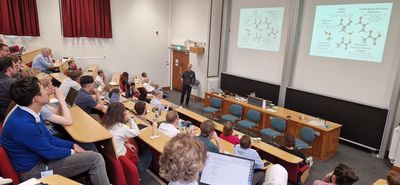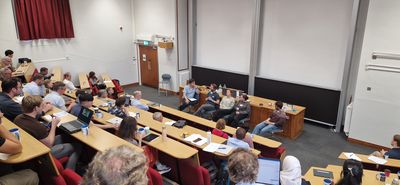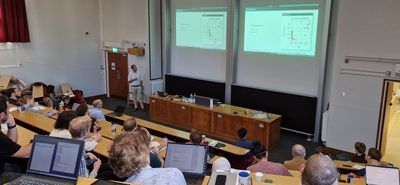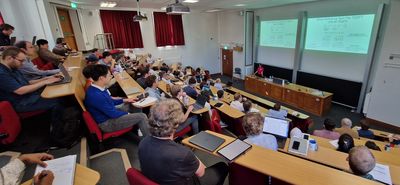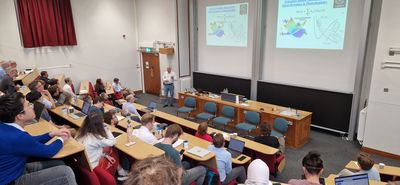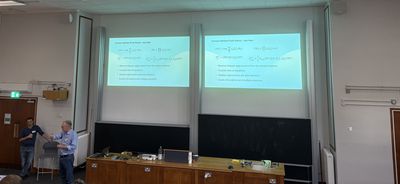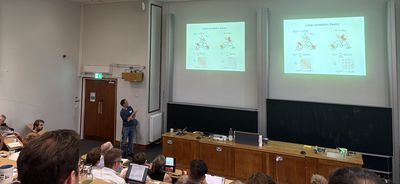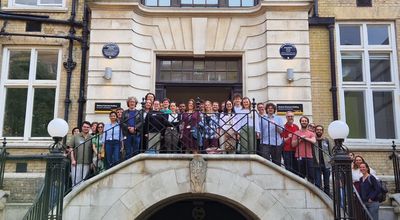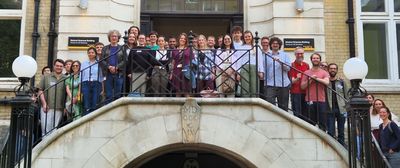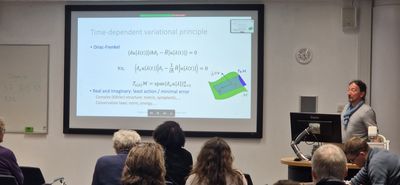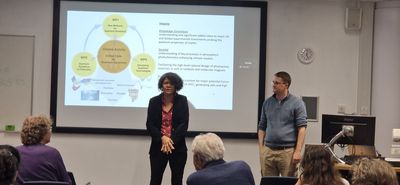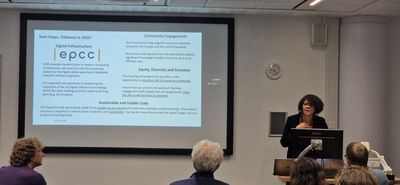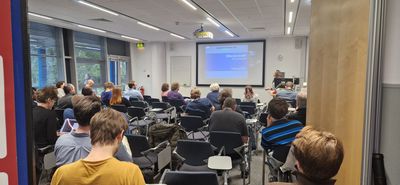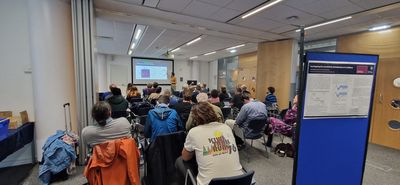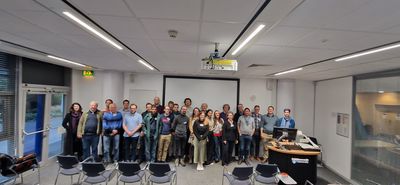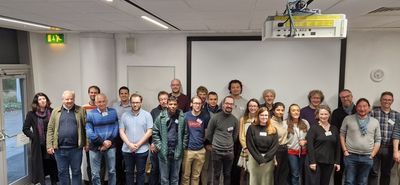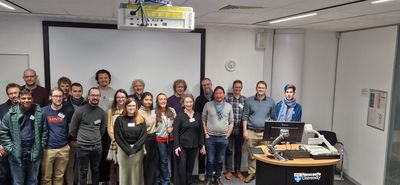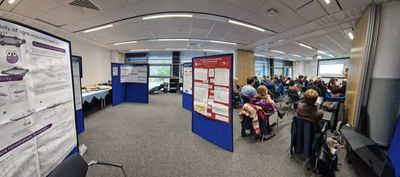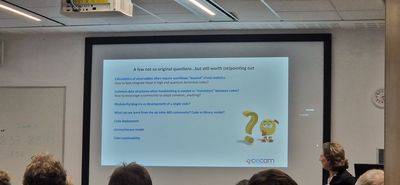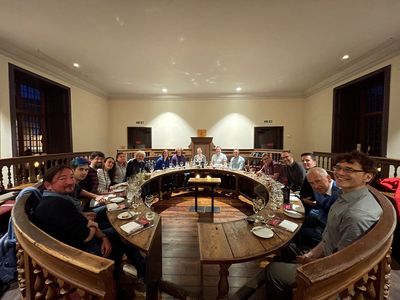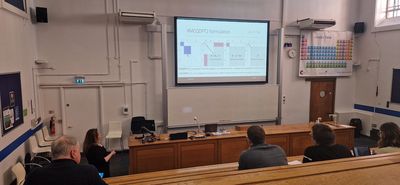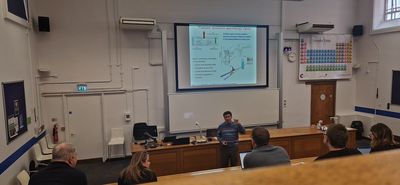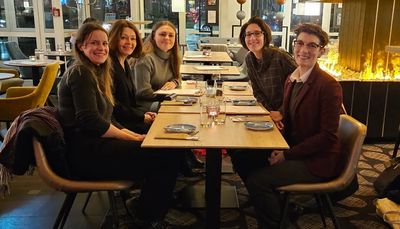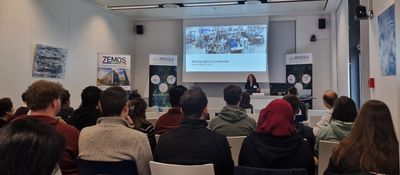COSMOS Electronic Structure Theory for Dynamics - University of Oxford, Sept 8th - 9th 2025
We held a very successfull workshop on electronic structure theory for nonadiabatic excited state dynamics with over 70 participants accross the 2 days.
The goal of this workshop was to strengthen the important links between electronic structure theory and dynamics, both in terms of practice and method development. Our hope is that the meeting created exciting scientific opportunities going forward.
Our list of invited speakers, as well as more information about the workshop please click HERE, or navigate to “Further Info” above, “Past Events” and select “Workshops”.
Symposium on Advances in Photochemistry - UCL, August 5th 2025
We were honoured to host an afternoon symposium on Advances in Photochemistry, at UCL on August 5th 2025. Our distinguished speakers were Professor Toshinori Suzuki, Dr Tracey Clarke, Professor Chiara Capelli and Dr Sandra Gomez Rodriguez.
To find out more details about the event, please use the following LINK to go to the event page..
Theory for XFEL Research in Chemical and Condensed Matter Science - Imperial College London, July 1st and 2nd 2025
The meeting on ‘Theory for XFEL research in chemical and condensed matter science’, which took place 1st-2nd July 2025 at Imperial College, London (UK).
This meeting initiated a discussion between theoretical and experimental communities to enable better XFEL experiments in the future. A particular emphasis was be placed on the development of theoretical predictions before beamtimes to ensure that the most efficient strategies are adopted before measurements. At this meeting, the potential to use high-quality calculations of dynamics and experimental observables (both spectroscopic and scattering) for gas, solution phase and solid-state experiments was discussed.
The event webpage HERE (this link may no longer be live after the event has passed)
COSMOS ECR Workshop: Career Development and Science - UCL, 30th April - 1st May 2025
The COSMOS Team was delighted to host the first COSMOS ECR Workshop: Career Development and Science.
The event took place at University College London’s main Bloomsbury campus, in the Chemistry and Medical Sciences buildings.
We welcomed an excellent panel of speakers at various stages of their academic careers, each delivering engaging 30-minute talks on their academic journey and scientific research. The workshop also featured a lively panel discussion, informative and hands-on Quantics training sessions and a focused Grant Writing and Pitch Meeting session. The event was designed to support and inspire early career researchers on their journey towards a successful academic career.
Additionally, many of the project members attended a session of karaoke in the evening, including an excellent group rendition of Don’t Stop Me Now.
Quantics Training Day - Online and In Person, UCL, November 7th
Our first Quantics Training day took place on Thursday November 7th from 10am - 4pm(UK). We were very happy to host 20 people in person and 40 people online. The day was very successful with lots of good questions, excellent team work and a lot of progress made.
Thank you very much to the members of the Worth Group for acting as helpers/troubleshooters throughout the day.
All the materials required by attendees are on the Quantics web-site under Quantics Tutorial.
If you would like to try out the tutorials you will need Quantics installed on a laptop. Those who are not registered users with Quantics, can find a tar-ball of the code on the web-site. Please read the following advice before attempting to install:
- If you have the gfortran compiler installed it should work straight away.
- You will also need to have gnuplot installed for the analysis.
- If you have problems, the documentation in doc/index.html has some help, otherwise please feel free to send questions to cosmosproject@ucl.ac.uk.
Unpack the Quantics tar-ball in a directory, go to the install directory and type install_quantics -y.
First Official Meeting of the COSMOS Project Team - Newcastle University, September 25th - 26th
The COSMOS team and project partners came together to discuss ideas and possibilities over two days.
It was a lively meeting, with the first afternoon devoted to presentations by the team on key topics, along with a discussion session to propose future developments. A presentation was also given on computational resources and future architectures and how best to use them.
The second day was devoted to talks by partners and early career researchers on their science and how COSMOS can be involved, and there were posters to further disseminate work by groups and focus discussions in the breaks.
The meeting finished with a visit from Chi Onwurah, MP for Newcastle and Chair of the government Select Committee on Science, Innovation and Technology who gave a brief questions and answers session on how the new government can support science research.
For further details from the lead up to the event, including travel information and the program of events, go to the First Official Meeting Page
CECAM Workshop on Standardizing Nonadiabatic Dynamics: Towards Common Benchmarks- 21st-24th May 2024
CECAM-FR-MOSER, Paris, France
COSMOS Project Partners Federica Agostini (University Paris-Saclay/CNRS) and Sandra Gómez (University of Salamanca), alongside Lea Ibele (University Paris-Saclay/CNRS) and Antonio Prlj (Ruđer Bošković Institute), organised this CECAM flagship workshop at the Maison de la Simulation in Saclay.
The 3 and a half day workshop was aimed at building a consensual and widely accepted benchmark set for nonadiabatic dynamics methods.
With an alternative format, sessions were split into two parts. The first, an active discussion about benchmarking problems, molecular systems and relevant observables. The second, a “hands-on testing”, where the participants examined the suggested systems with their own methods and codes. Early career researchers were encouraged to contribute flash presentations outlining challenges they encountered in their research for nonadiabatic dynamics methods.
Hands-on testing sessions were led by COSMOS researchers Graham Worth, Basile Curchod and Nađa Došlić with a flash presentation contributed by Leon Cigrang.
The effective new format and fantastic opportunities for in depth discussion resulted in an engaging and exciting workshop achieving the outlined objectives.
Further information about the aims and content of the event can be found on the CECAM website.
CECAM Workshop on Theoretical and Experimental Advances in Atmospheric Photochemistry - 26th-28th March 2024
CECAM-HQ-EPFL, Lausanne, Switzerland
Basile Curchod and his University of Bristol colleague Professor Andrew Orr-Ewing organised a highly successful flagship workshop at the CECAM headquarters. This 3-day workshop brought together early career researchers and world-leading scientists focussed on the theoretical and experimental study of atmospheric photochemistry.
Alongside scientific presentations and posters were open discussion sessions and round-table sessions enabling the sharing of thoughts, ideas and views on the current and future directions of the field. Research carried from COSMOS Project was presented by both Project Lead Graham Worth and PhD student Leon Cigrang.
Futher information about the event and talks can be found on the CECAM website.
Article from the Curchod group features in famous blog
Dr Derek Lowe’s blog ‘In the pipeline’ is published in Science
A recent article by the on the photochemistry of thiophenone, published in the Journal of the American Chemical Society, has recently been highlighted in Derek Lowe’s blog post ‘In the pipeline’, published by Science. The article reported on a joint theory-experiment effort to understand the complex photochemistry of thiophenone, combining time-resolved ultrafast electron diffraction and nonadiabatic molecular dynamics simulations. Dr Lowe suggests that the photoexcited thiophenone molecule can be pictured as ‘extremely drunk and full of caffeine’, explaining the rather unexpected chemical transformations taking place both in the excited and the ground electronic state.
COSMOS Quantum Nonadiabatic Dynamics Afternoon - 2024
On Friday 22nd March, Dmitry Shalashilin and his local team at the University of Leeds hosted an afternoon event featuring talks from Sergei Tretiak and Anastasia Bochenkova.
As the first opportunity for the COSMOS Senior Team to meet in person it was a great opportunity for introductions and collaboration alongside two fantastic scientific contributions. For further details click here
Prediction Challenge: Cyclobutanone Photochemistry
Leading groups in the field of photoexcited molecular dynamics were invited to take part in the Journal of Chemical Physics Prediction Challenge investigating the photochemistry of cyclobutanone. Researchers from the COSMOS project have submitted research articles attempting to predict the results of experiments performed at the SLAC Megaelectronvolt Ultrafast Electron Diffraction facility. For more information about this exciting new initiative click here
Day(s) of Women in Science - 8th-9th February 2024
RESOLV Cluster of Excellence, Ruhr University Bochum
In celebration of the United Nations International Day of Women and Girls in Science the Day(s) of Women in Science event was organised by Professor Martina Havenith-Newman at Ruhr University Bochum. The event featured a series of talks by distinguished female scientists Professors Helen Fielding (UCL), Francesca Calegari (DESY) and Polly Arnold (UC Berkley) who discussed their academic interests and career paths alongside the challenges that have faced as women in science. The event also featured a careers workshop supporting and encouraging attendees to clearly define their career goals in order to maximise success, as well as a discussion session focussing on the unique difficulties faced by women in science and the support systems for students, researchers and entrepeneurs. This event was attended by COSMOS Program Grant Manager Eryn Spinlove.
Program Grant Approval Publicised - Oct-Nov 2023
The approval of the COSMOS Program Grant was publicised online by UCL, University of Bristol, University of Warwick, University of Oxford, Newcastle University and University of Leeds as well as in the online publication The Quantum Insider. Below is an amalgam of the published articles.
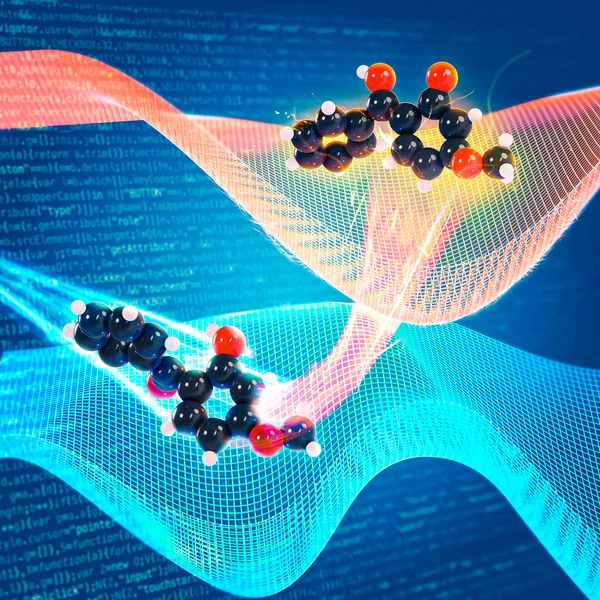
Scientists receive funding to create a universal software for quantum dynamics simulations
For the first time, scientists researching in the field of quantum dynamics (QD) will be able to access, develop and deploy a common software framework for simulations, removing many barriers that exist to achieving a deeper understanding across the quantum domain.
Scientists use powerful sources of light to study tiny particles, atoms and molecules, that make up the matter around us. These experiments can be used to answer important questions about how the motions of the particles manifest themselves in chemical reactions, material properties, and new quantum technologies.
To understand the results of the experiments, computer simulations are crucial. The computer-generated virtual model shows how these tiny particles move according to the rules of quantum physics. With QD simulations, researchers can thus predict and understand what’s happening to molecules during experiments.
This is a new field of research, and most research groups use their own custom-made software for their studies. This lack of unification and integration makes it difficult to use ideas from one group to improve the methods of another group.
The new international project titled COSMOS, funded by the Engineering and Physical Sciences Research Council (ESPRC) will develop a new unified code for QD simulations suitable for use by both computational and experimental researchers.
This universal software will enable a wider group of scientists worldwide to use computer simulations to explore the quantum world more efficiently, and it will aid researchers across a broad range of research to understand state-of-the art experiments and exploit quantum effects by the design of new molecules and materials.
Furthermore, by supporting a large yet integrated cohort of early-career researchers, this programme grant will provide an enormous acceleration to developments in QD, positioning the UK as a global leader in this domain as we move from the era of classical computation and simulation into the quantum era of the coming decades.
The Principle Investigators of this project are Dr Basile Curchod (University of Bristol), Professor Scott Habershon (University of Warwick), Professor Adam Kirrander (University of Oxford), Professor Tom Penfold (Newcastle University) and Professor Dmitry Shalashilin (University of Leeds) and is led by Professor Graham Worth (University College London).
